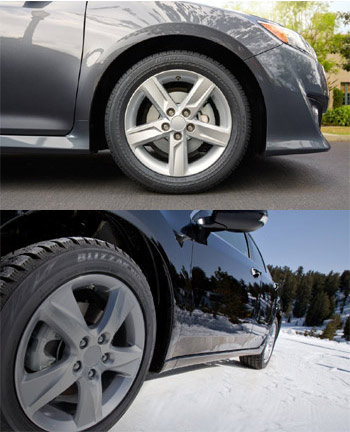 The differences between Winter Tires and All Season Tires. Depending on the weather and road conditions you drive on throughout the year you may prefer to have both or just All Season Tires.
The differences between Winter Tires and All Season Tires. Depending on the weather and road conditions you drive on throughout the year you may prefer to have both or just All Season Tires.
All Season Tires
All season tires are designed to perform in a different conditions including wet roads and light winter driving. All season tires offer the best of both worlds from summer and winter tires. Many vehicles come with all season tires from the factory. They provide a quiet ride, good tread life and fuel economy.
All Season, All Year Round?
Not always. Good performance in many conditions, but all season tires tend to loose traction in winter conditions. An all season tire is not designed to handle extreme winter conditions like getting through snow or driving on ice. Think of all season tires like shoes. You can wear shoes all year, but they aren’t ideal for all situations. It’s much better to have boots for the snow.
All season tires are a great option for drivers who live in moderate climates and do not encounter extreme cold, ice and snow in the winter months.
Winter And Snow Tires
There are specific features of winter tires that make them unique: tread rubber, tread depth and patterns, and biting edges.
When it comes to driving in winter weather, having the right tire matters. From heavy snowfall to black ice, winter roads are extremely unpredictable. These conditions challenge tires to provide traction like no other season of the year. The combination of cold temperatures, ice, and snow can be best met by winter tires, which are specially designed to perform in winter conditions.
